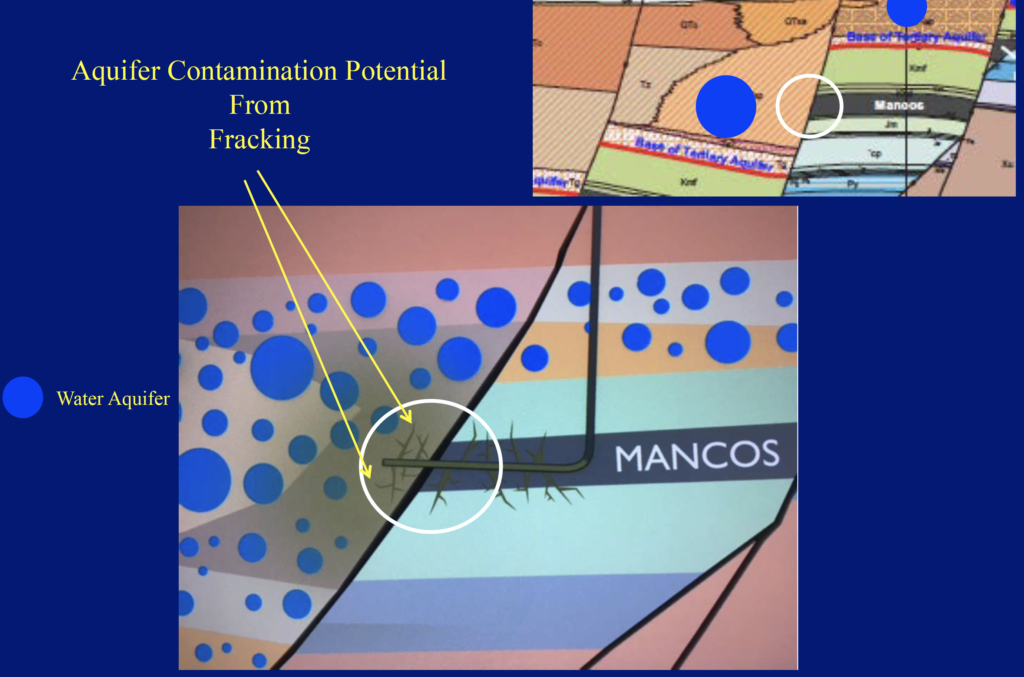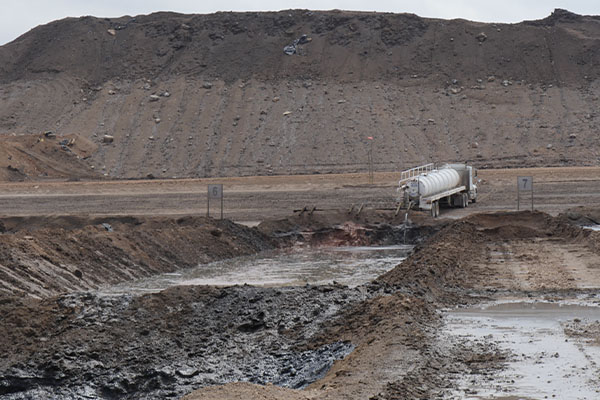
The four county Mid Region Council of Governments (MRCOG) convened without a quorum to hear a presentation on the impacts of fracking in the Middle Rio Grande Basin Albuquerque Basin by Don Phillips, Geologist retired. The presentation was followed up by a line of questions by committee members.
At the end of the presentation, a report was handed out to all MRCOG members. The hand out included the presentation and sample template for the Ordinance guidance. Template Guidance was based attorney Peter Adang’s consultation on the Science Oil and Gas Ordinance that was presented to Sandoval County back in 2018.
The current oil and gas ordinance guidance was written by oil and gas interests who have already inserted produced water guidance into the guidelines prior to the State even being close to writing the regulations. The premature insertion is prior to NMED, who just completed the first Public notice and a series of statewide informational meetings to hear from the public on produced water being used as beneficial use (water right) outside the industry.
Produced water is the flow back of fracking fluids and fracking process contaminated waste that is liquid and not any chemical similarity as H20. It was suggested by Elaine Cimino that the language on produced fracked water be stricken from the current guidance.

The industry is so blatant, it already sees produced water being used for return flow credits for the City of Rio Rancho, or to the Rio Grande or injected into our Aquifer injection and recovery system. The City of Rio Rancho already has had 125 drinking water quality violations in the third quarter of this past year.
During public comments Norm Gaume cautioned the Board to consider the water in the river as the only drinking water source that they are going to have to rely on in Albuquerque Basin and due to climate and drought conditions that is going to evaporate at high rates. Norm Gaume is a retired water engineer and worked for and with NM Government, water utility and state agencies on water resource management.
At the November MRCOG Water Board meeting Elaine Cimino introduced a copy of the 5-year moratorium for the Albuquerque basin. The Governor of Laguna Pueblo Herrera submitted a letter regarding tribal consultation between the Pueblo and MRCOG. The Governor said when submitting the letter that the Pueblo supported a moratorium and wanted to participate in a consultation process. He indicated that Laguna Pueblo lands included Sandoval, Bernalillo and Valencia Counties.
MRCOG executive Director, Nick Cave, keeps reiterating that this process is just a guidance, and his staff appears to soft-pedal the Boards influence and recommendations on how to move forward throughout the basin and allow fracking. What we do not hear is the concern for the environment, the Rio, the water, air and peoples’ health.
Regulations allow pollution. Regulations help when they are enforced and are stringent. What many state agencies and legislators want is to regulate fracking, not stop fracking. A perfect examples are the methane rules and the produced water rules that are currently being drafted behind closed doors. The State government has a transparency problem. Governor Grisham and state agencies are looking at allowing oil and gas to donate $100 M for “bought and biased” science research in a public-private partnership with the 4-statewide institutions in the NM Consortium, UNM, NMSU, NM Tech and LANL, What we have is an oil and gas funded research that will compromise regulation. It is the way that oil and gas and NGO attorneys allow law that continually rigs the system in oil and gas favor. It also allows for contamination of the aquifer, if and when they allow it. A moratorium on fracking on the Rio Grande should be permanent and throughout the state. Hydraulic multidirectional drilling is not regulated in New Mexico only conventional drilling is. With only 13 inspectors it is not possible for the State to even audit the oil and gas industry 56,000 wells.
Senate Bill 459 stops new fracking leases in the State for four years until the studies, reports and legislation is passed statewide that takes into considerations of impacts on health, of residence and workers, water and air and soil. Find out more Here
As far as protections for the Albuquerque basin, at least the MRCOG voting members will not be able to say they were not aware of the problem.
The Report the Guidelines Addendum B
updated MRCOG Full Board Meeting December 12, 2019